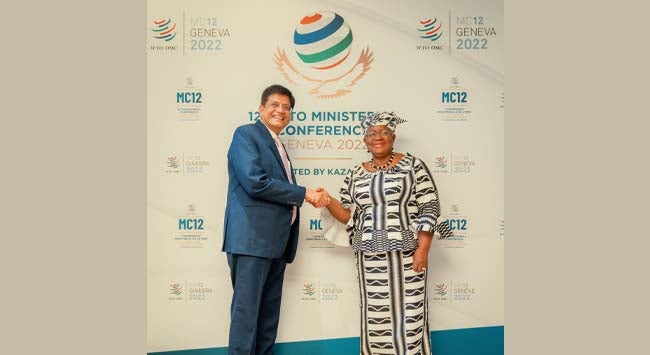Summary
The 12th Ministerial Conference (commonly called the MC12) of the World Trade Organization (WTO) witnessed a different India. In contrast to its obstructive role in several past WTO ministerial conferences, India demonstrated distinct flexibility at the MC12, enabling the global trade body to reach purposeful outcomes.
The 12th Ministerial Conference of the World Trade Organization (WTO), popularly alluded to as the MC12, concluded in Geneva on 17 June 2022. The MC12 produced the ‘Geneva Package’, comprising far-reaching decisions on the waiver of intellectual property (IP) rights on COVID-19 vaccines, fisheries subsidies, food security, e-commerce and WTO reforms.
Coming in against the backdrop of COVID-19, the Russia-Ukraine conflict and rising global food and energy prices, the WTO was under pressure to deliver decisions to address global health and food concerns. It was also incumbent upon it to ensure that the much-maligned multilateral rules-based trade system was not irrelevant and was capable of delivering meaningful outcomes.
Considerable cynicism prevailed in the run-up to the MC12 on its ability to deliver. This was largely due to the sharp variances between several major WTO members on various issues. Much attention was focused on India in this regard. On almost all major issues – IP waivers for COVID-19 vaccines, fisheries subsidies, the continuation of the moratorium on customs duties on electronic transmissions and rationalising global food exports – India’s position differed sharply from several other major WTO members, particularly the developed countries.
India’s traditional inflexibility at the WTO and global trade issues generated apprehensions that it might again be a ‘spoiler’ and prevent decision-making at the MC12. The fears, though, were put at rest. India played a constructive and purposeful role in delivering the ‘Geneva Package’. This was notwithstanding several of its demands not being reflected in the final outcomes from MC12.
On IP waivers for COVID-19 products, for example, India, along with South Africa, had long demanded that such waivers be allowed not just for COVID 19 vaccines, but also for therapeutics and medical devices. The demand was at variance with that of several developed countries which have been at the forefront of manufacturing COVID-19 vaccines. These countries were unwilling to accept waivers on patent protection for vaccines. Pharmaceutical companies producing these vaccines exerted considerable pressure on their host countries to resist the proposal. India’s demand for extending the scope of the waiver to therapeutics and devices enhanced the resistance to such waivers within the WTO.
The MC12 has allowed WTO members to make COVID-19 vaccines produced by manufacturers from the other member countries – and holding patents on these vaccines – without the authorisation of the latter. These vaccines can also be exported to the other members. The decision would be taken as a vindication of India’s demand for waivers on patents of COVID-19 vaccines. However, the waiver has been limited to vaccines and has not been extended to therapeutics and for medical devices. Nonetheless, India agreed to the decision.
India’s recent decision to restrict the export of wheat at a time when global food supplies have been disrupted due to the conflict in Ukraine has caused a major stir. The MC12’s decision to restrict the WTO members from banning food exports for non-commercial purchases by the World Food Programme was agreed to by India. While this might be considered an example of India’s ‘flexibility’, it is important to note that the same decision allows the members to restrict exports for ensuring domestic food security – the ground on which India had restricted wheat exports.
India also relented to the decision to discontinue subsidies that encourage illegal, unregulated and unreported fishing leading to overfishing. The decision does not indicate whether – as India had argued – government subsidies can be retained to support the livelihoods of poor fishermen.
Finally, on extending the moratorium for imposing customs duties on electronic transmissions – a decision India has been steadfastly opposed to on the ground that it results in developing country importers of electronic transmissions being denied considerable revenue – India consented to a further extension till the next ministerial conference.
The fact that India agreed to the decisions of MC12 despite its demands not being met in entirety underscores a welcome flexibility in India’s engagement on global trade issues. The flexibility also demonstrates a willingness to stay committed to the cause of global trade by ensuring that differences with the other members do not impede the adoption of key decisions by the WTO.
The MC12 would go down in India’s history of engaging at the WTO as a turning point. It can very well mark the beginning of the end of trade pessimism in India.
. . . . .
Dr Amitendu Palit is a Senior Research Fellow and Research Lead (Trade and Economic Policy) at the Institute of South Asian Studies (ISAS), an autonomous research institute at the National University of Singapore (NUS). He can be contacted at isasap@nus.edu.sg. The author bears full responsibility for the facts cited and opinions expressed in this paper.
Credit: Piyush Goyal Twitter
-
 More From :
More From :
-
 Tags :
Tags :
-
 Download PDF
Download PDF



